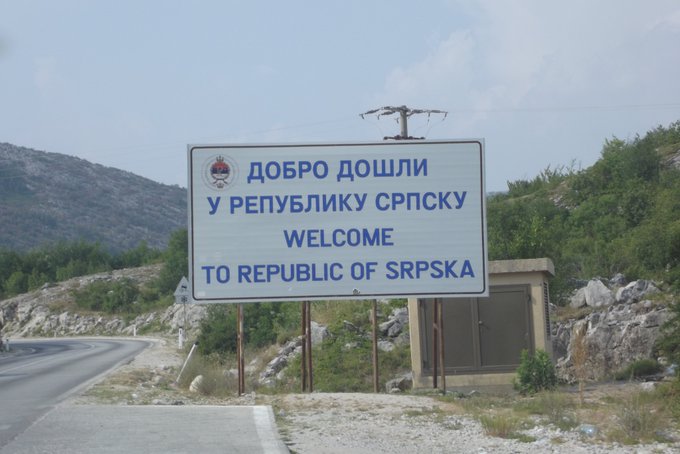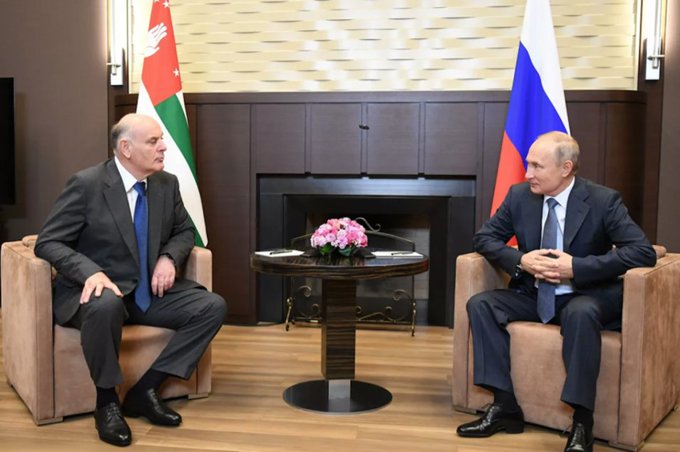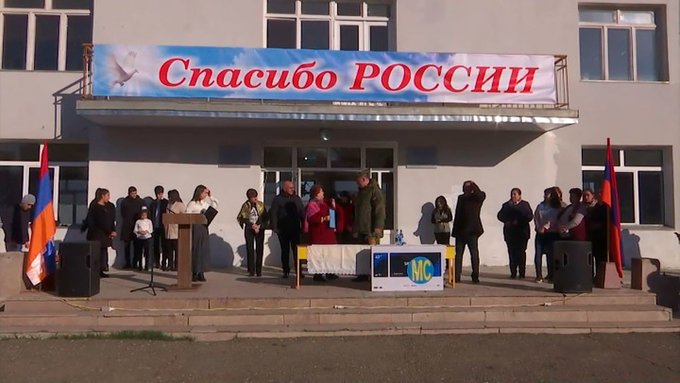Tension’s Rise in Gagauzia as Russia’s War Drags On
A political crisis is quietly brewing in Moldova’s Autonomous Territorial Unit of Gagauzia. Over the past few months, the rhetoric emanating from the People’s Assembly of Gagauzia (Gagauziyanin Halk Topluşu) towards Chisinau has become increasingly hostile. Moreover, the People’s Assembly is trying to expand its power at the expense of both the central government in Chisinau and Irina Vlah, the region’s governor, known as Bashkan.
These alarming developments come as Russian forces continuously attempt to cut off the Budjak region, an area of southwestern Ukraine that borders Gagauzia, from the rest of Ukraine, by attacking the Zatoka bridge. Some commentators fear that if the Russians successfully cut the Budjak off from the rest of Ukraine, Moscow may attempt to revive the People’s Republic of Bessarabia and lay claim to southern Moldova. For their part, the Gagauz elite, located in the regional capital of Comrat, have done little to elevate these concerns.
The Gagauz are no strangers to conflict with Chisinau. In August 1990, local elites in Comrat created Eurasia’s first de-facto state when they declared the creation of the Gagauz Republic. While Gagauzia was peacefully reintegrated into Moldova in 1994, relations between Chisinau and Comrat have remained tense. In 2014, the Gagauz organized an illegal referendum in response to the signing of an Association Agreement between Moldova and the European Union, which saw the majority of voters reaffirmed their support for the region’s independence and closer ties with the Russian-led Commonwealth of Independent States.
Many Moldovan commentators criticize the Gagauz for failing to fully integrate with Moldova. One commentator even went as far as to claim that Transnistria was more integrated with Moldova than Gagauzia. These claims are not entirely unfounded. For example, a survey conducted in 2018 found that less than five percent of school students from Gagauzia studied Romanian, which is the official language of the Moldovan educational system.
In recent years, leaders in Gagauzia have regularly been accused of demonstrating pro-separatist tendencies. In 2015, political elites from the region attempted to establish a separate diocese for Gagauzia. More recently, in late January 2022, the People’s Assembly announced its intention to send a delegation from Gagauzia to Moscow to negotiate a contract for the region’s gas supply directly with Gazprom. Thus, disputes between the Gagauz and the central government are not uncommon. However, in light of Russia’s invasion of Ukraine, and in particular, Russia’s continued efforts to cut the Budjak off from the rest of Ukraine, recent developments are particularly alarming.
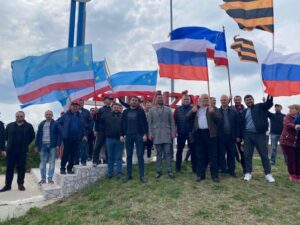
Image: Protestors stand in front of the Gagauzia sign waving Russian and Gagauz flags near Comrat. (Source: https://gagauzyeri.com/v-komrate-s-flagami-rossii-gagauzii-i-moldovy-proshel-avtoprobeg-v-podderzhku-georgievskoj-lenty/)
Tensions rose in April when Maia Sandu, the President of Moldova, signed a law that banned symbols that promoted “war, aggression, and genocide”. As a result, the controversial “Z” and “V” symbols were outlawed, as well as the Ribbon of Saint George, a symbol traditionally associated with Victory Day, which commemorates the Soviet Union’s victory over Nazi Germany. The new law stated that those who displayed these symbols could be fined up to 9,000 Moldovan Lei (€440) and receive up to sixty hours of community service.
The outlawing of the Ribbon of Saint George sparked an outburst of pro-Russian sentiment in Gagauzia. Deputies from the People’s Assembly criticized the decision. At the same time, dozens of people took to the streets of Comrat in protest, waving Russian and Gagauz flags. Graffiti supporting Russia’s war effort also appeared across Gagauzia. One particularly notorious piece read “ГагауZия с Vами” (Gagauzia’s with you), highlighting the letters “Z” and “V”.
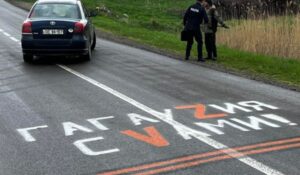
Image: “ГагауZия с Vами” (Gagauzia’s with you). (Source: https://point.md/ru/novosti/proisshestviya/politsiia-otreagirovala-na-nadpis-gagauziia-s-vami-na-asfal-te-v-tomae/)
Towards the end of April, deputies from the People’s Assembly unanimously adopted a law entitled “On the Symbols of Victory in the Territory of Gagauzia”. The law permitted symbols associated with the Great Patriotic War to be flown in Gagauzia. This meant that the Ribbon of Saint George could be displayed, but the “Z” symbol could not.
Soon afterward, the law was signed by Irina Vlah, the Bashkan (Governor) of Gagauzia. The Moldovan police stated that they would only recognize laws passed in Chisinau and that those found wearing the Ribbon in Gagauzia would be fined. This led to a political dispute, with deputies arguing that in Gagauzia, laws passed by the People’s Assembly took precedent over those passed in Chisinau. The Comrat Appellate Court quickly suspended the new law passed by the People’s Assembly because it violated the law signed by Maia Sandu a few weeks prior. In defiance of Chisinau, the People’s Assembly organized an emergency session the night before Victory Day. At the session, deputies once again voted in favour of a law that legalized the use of the Ribbon of Saint George in Gagauzia.
It is worth noting that not everybody in Gagauzia supported the People’s Assembly’s efforts to defy Chisinau. In Ceadîr-Lunga, Gagauzia’s second-largest city, the local authorities appealed to people not to wear the banned symbol. Similarly, the local authorities from Vulcănești, the Gagauzia’s third-largest city, posted a notice on their website, reminding people that the police would fine anyone caught wearing the Ribbon, irrespective of laws passed by the People’s Assembly. Nevertheless, on May 9, many people across Gagauzia took to the streets proudly displaying the Ribbon. In Comrat, several prominent political figures wore the Ribbon while giving commemorative speeches. Interestingly, however, Vlah chose not to wear it.
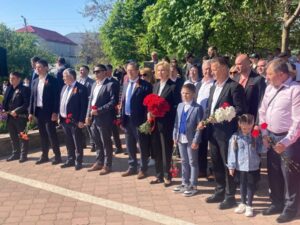
Image: A Picture taken during Victory Day Celebrations in Comrat. Note how Vlah is not wearing the St George’s Ribbon. (Source: https://gagauzinfo.md/top1/66880-77-let-pod-mirnym-nebom-v-komrate-proshli-torzhestva-po-sluchayu-dnya-pobedy.html)
Since Victory Day, the rhetoric towards Chisinau from the People’s Assembly of Gagauzia has become increasingly hostile. At a recent session, deputies accused Moldova of trying to destroy Gagauz statehood. They claimed that the arrest of Dodon was proof that Sandu was attempting to establish a “dictatorial regime”. Deputies also proposed an amendment to the Electoral Code of Moldova and demanded that five seats in the parliament be reserved for deputies representing Gagauzia.
Additionally, deputies also adopted anti-LGBT legislation, which bans the organization of any form of pride parade in Gagauzia. Deputies justified the law’s adoption by claiming that promoting “non-traditional” relationships is detrimental to Gagauzia’s “Orthodox Christian foundations”. The new law was passed just days after it was announced that several LGBT events would take place in Chisinau in June, and the American Ambassador to Moldova flew the Rainbow flag outside the embassy to mark International Day against Homophobia, Transphobia, and Biphobia. Igor Grosu, leader of the Party of Action and Solidarity and current speaker of the Moldovan Parliament, criticized the new law. Several Moldovan commentators pointed out that the new law violated the Moldovan constitution and claimed it was “proof” that the deputies in Gagauzia were “undemocratic”.
An internal power struggle between the Baskhan and members of the People’s Assembly has recently emerged, with deputies accusing Vlah of abuse of power and Vlah accusing deputies of trying to undermine her authority. In April 2022, Vlah refused to sign the 2022 budget into law. Sources close to Vlah claimed her refusal was based on the fact that the new budget reduced funding to the region’s Executive Committee by 20 percent. The budget was returned to the People’s Assembly, where deputies once again voted in favour of the proposed budget. According to Gagauz law, the Bashkan’s veto can be overcome if two-thirds of deputies vote in favour of the law. However, Vlah refuses to sign the new budget and apparently intends to appeal it in the Comrat Appellate Court.
On May 25, 2022, Georgy Leichu, Vice-Speaker of the People’s Assembly of Gagauzia, proposed a bill that regulated the work of the region’s Executive Committee. The law states that the Bashkan must “live in the territory of Gagauzia, have a higher education in the field of management, and have an impeccable reputation”. According to the proposed law, if this criterion is not met, the People’s Assembly can dismiss the Bashkan.
The law was passed by the People’s Assembly and sent to the Bashkan for signing. However, it is unlikely that Vlah will sign this law either. The Executive branch has already complained that the law is part of an effort by the People’s Assembly to subjugate the work of the Bashkan. These concerns are not misplaced, as the term “impeccable reputation” seems intentionally vague and would likely make it very easy for the People’s Assembly to dismiss the Bashkan.
Amidst these rising tensions, it appears as if the Russian government is increasing its efforts to win support amongst Moldova’s Gagauz population. A recent segment from Russian state TV claimed that Ukrainian soldiers are looting houses in Gagauz villages across southwestern Ukraine. This report received significant attention in the Gagauz media. Additionally, a resident from Ceadîr-Lunga, recently died while fighting for the Russian army. The young man was praised as a hero by several Gagauz media outlets.
For now, the dispute between Comrat and Chisinau will likely remain confined to the political realm. The conflict between the Bashkan and the People’s Assembly creates an internal divide amongst the Gagauz political elite. It, therefore, weakens the People’s Assembly’s position vis-à-vis the Moldovan government. However, there are concerns that this could change. Recent events have demonstrated that the Gagauz population remains mostly pro-Russian. Moreover, the Russian Federation may turn its attention to Gagauzia, which would, in turn, likely stoke secessionist sentiments further.
Author: Keith Harrington



